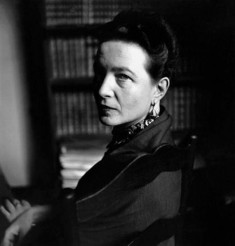| Simone de Beauvoir | |
|---|---|
 |
|
| Philosopher | |
| Specialty | Existentialism, feminism, Marxism |
| Born | Jan. 9, 1908 Paris, France |
| Died | Apr. 14, 1986 (at age 78) Paris, France |
| Nationality | French |
Born on January 9, 1908 in Paris, France, Simone de Beauvoir was an influential and well-respected French author, existentialist philosopher, social theorist, active feminist and political activist. She was one of the leading figures in 20th century feminist existentialism and she was a pioneer in second-wave feminism, which began in the US in the early 1960s.
De Beauvoir published numerous philosophical essays, including the 1944 Pyrrhus et Cineas and the 1947 work Ethics of Ambiguity, in addition to short stories, novels exploring major existentialist themes, a four-volume autobiography, several biographies, and monographs on feminist, philosophical, social and political issues (she was a vehement critic of capitalism).
Beauvoir’s Early Life
Born Simone Lucie Ernestine Marie Bertrand de Beauvoir to Francoise and George Bertrand de Beauvoir, she and her younger sister Helene grew up in a well-respected bourgeois family and they were educated in prestigious private institutions. Although Simone was a devout Roman Catholic (she even considered being a nun) as a child. But following a religious crisis, she became an atheist while she was still in her teen years and she continued to have no religious faith for the rest of her life.
Simone de Beauvoir was intellectually precocious and she started to write stories at the early age of eight. She studied mathematics and literature (she was fascinated with English literature and Virginia Woolf was her favorite writer) and at the age of 21, she left home to live with her grandmother and to study philosophy at the prestigious Sorbonne. She passed her exams in philosophy by writing a thesis on the German philosopher Gottfried Leibniz and she was the youngest student ever to pass this exam.
Young Adult Years
In 1929, while de Beauvoir she was taking courses at the Ecole Normale Superieure, she met Jean-Paul Sartre, with whom she started the famous open “marriage.” Although Sartre proposed to her, their lifelong relationship was never institutionalized. They committed themselves to benefit from the freedom to love other people while retaining honesty between them.
In 1939, while serving as a professor, the parents of one of her underage students pressed charges against her for seducing a minor, which resulted in having her teaching license permanently suspended.
Beauvoir’s The Second Sex
 Simone’s famous The Second Sex, which focuses on philosophical arguments for the dissolution of the “eternal feminine” myth, has become a classic of feminist-oriented literature. She emphasized the fact that universally stereotyped women have historically been regarded as being out of “normality.” She said that in order for women’s oppression to stop and for the feminist movement to succeed, this fundamental assumption must be annihilated in the first place.
Simone’s famous The Second Sex, which focuses on philosophical arguments for the dissolution of the “eternal feminine” myth, has become a classic of feminist-oriented literature. She emphasized the fact that universally stereotyped women have historically been regarded as being out of “normality.” She said that in order for women’s oppression to stop and for the feminist movement to succeed, this fundamental assumption must be annihilated in the first place.
She also felt that women must surpass the “immanence” to which they were associated and reach “transcendence,” a state in which they can act responsibly in a world where they have the freedom of choice. The Second Sex was originally published in Les Temps Modernes, a monthly journal founded in 1945 by de Beauvoir, who also remained an editor for this journal until 1986, and Sartre, among others. The second translation in English was published in 2009 and it presents the complete original text in English.
Other Contributions to Philosophy and Feminism
Her other famous novels that address existentialist themes intertwined with feminist issues are the 1943 metaphysical novel entitled She Came to Stay, a fictional account of her relationship with Sartre. She also wrote the 1954 work entitled The Mandarins. The latter novel won her the prestigious Prix Goncourt prize that same year and it was described by the famous British writer and philosopher, Iris Murdoch, as “endearing because of its persistent seriousness.”
In her 1947 philosophical essay entitled The Ethics of Ambiguity, Simone explored in a simple manner the notion of existentialist ethics by making a parallel between the dilemma of complete freedom and the constraints of various circumstances. Her conclusion revealed her radical view on freedom, claiming that our existence incorporates a “finiteness open to infinite.”
Simone de Beauvoir passed away at the age of 78 on April 14, 1986. The cause of her death was pneumonia. She is interred next to her lifelong partner Jean-Paul Sartre, who died on April 15, 1980, at the age of 74 at the Montparnasse Cemetery in Paris.